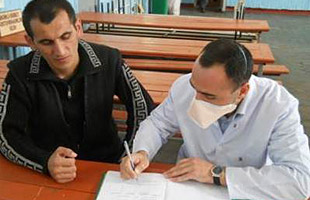Tuberculosis (TB) is a major health problem in many of the world’s prisons: infection rates can be more than 10 times higher than in the general population. Frequently overcrowded and poorly ventilated, many prisons lack early detection and sound treatment programmes to combat the disease – even though many prisoners come from population groups that are already at high risk of TB infection and disease, such as people who inject drugs or are homeless.
But, in Azerbaijan – a country bordering Russia, Georgia, Armenia and Iran – a TB programme in the country’s prisons is helping reverse the spread of the disease. Fifteen years ago, 7 in every 1000 Azerbaijan people were ill with TB. By last year, rates had fallen to 1 in every 1000 people. Still, there is substantial work ahead to end the general epidemic and address multidrug-resistant disease. Part of the response is addressing TB in vulnerable groups, including prisoners.
A 20-year commitment to control TB
In 1995, supported by the International Committee of the Red Cross, the country introduced the WHO DOTS approach to enable TB care and control in all of the country’s prisons. DOTS involves fostering political commitment and financing for TB efforts in prisons as well as linking to the wider national TB programme and health services; enabling earlier diagnosis; providing standardized treatment with supervision and patient support; providing effective drug supply and management; and monitoring and evaluating the programme.
Routine screening of detainees has been key in Azerbaijan. Once a year, the country’s prisons hold dedicated TB days to screen all detainees and raise awareness about risk-factors and symptoms of the disease. Those prisoners who test positive are transferred to a centralized TB prison hospital for treatment and additional support.
"We’ve made sustained efforts to actively detect TB in prisons for more than a decade now,” says Dr Rafail Mehdiyev, Head of the Main Medical Department of the Azerbaijani Ministry of Justice. "We set up a specialized TB hospital for detainees, with infection control measures and a new laboratory that uses all the diagnostic techniques recommended by WHO, including molecular-genetic testing.”
However, it is not just the prison’s detainees and health personnel who play a role in the programme. Prison officers and other non-medical staff are taught about the symptoms, risk factors and treatment of TB through mini-plays, performed in the country’s prisons by a state theatre group.
"Most prison officers are not medical workers, so they need to be educated about TB. We train them so that they understand the basics of the disease and convey consistent messages to detainees about the importance of TB control,” explains Dr Mehdiyev.
The importance of rigorously completing TB treatment is reinforced to all infected prisoners who start a course of medication. In addition, with so many detainees released from prison part-way through treatment, a local nongovernmental organization provides a vital service offering support to newly-released detainees to ensure they complete the medication regimen.
International recognition
Azerbaijan’s national programme has developed in line with the WHO European Office’s Consolidated Action Plan to Prevent and Combat M/XDR-TB 2011-2015 which promotes integrated care, and collaboration across health and justice ministries.
WHO is helping the country strengthen programmatic management of drug resistant TB, improve TB drug management, expand access to rapid diagnostics and further develop its laboratory network. In addition, the country receives support for TB control in prisons from the Global Fund to fight AIDS, Tuberculosis and Malaria.
"In order to support Member States improve their health services, we facilitate and nurture intercountry exchange of know-how and good practices. Azerbaijan’s successful implementation of state-of-the-art TB care in prisons can be used as a model for other countries,” highlights Dr Masoud Dara TB and M/XDR-TB Programme Manager of WHO Regional Office for Europe.
The prison programme has achieved recognition for its work in protecting the health of detainees, including an award from the International Corrections and Prisons Association (ICPA) in 2013.
"The Azerbaijani Ministry of Justice has achieved solid TB cure rates and is implementing WHO recommended approaches to case finding and treating tuberculosis in prisons,” says Dr Fuad Mirzayev, medical officer from the WHO Global TB Programme.
In 2012, a demonstration centre was set up within an Azerbaijan TB prison hospital to train international health workers and prison staff on how to implement similar programmes in their prisons. Last year, WHO officially recognized the facility as a WHO Collaborating Centre on the prevention and control of tuberculosis. In May 2015, the centre will host its first international training event. It has already trained more than 100 representatives from countries across Central Asia.
(World Health Organization)
ANN.Az
Follow us !











